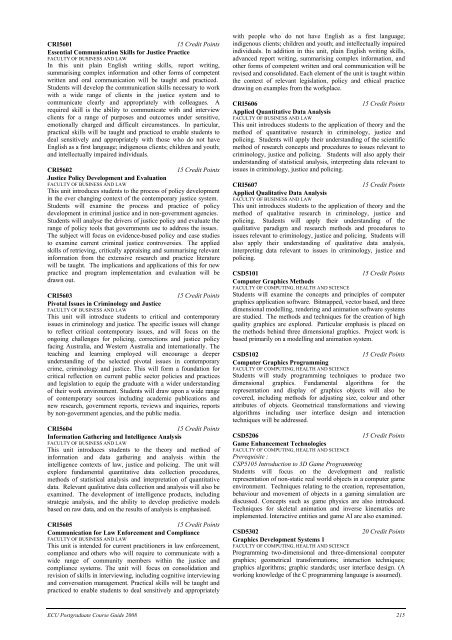Postgraduate - Edith Cowan University
Postgraduate - Edith Cowan University
Postgraduate - Edith Cowan University
Create successful ePaper yourself
Turn your PDF publications into a flip-book with our unique Google optimized e-Paper software.
CRI5601 15 Credit Points<br />
Essential Communication Skills for Justice Practice<br />
FACULTY OF BUSINESS AND LAW<br />
In this unit plain English writing skills, report writing,<br />
summarising complex information and other forms of competent<br />
written and oral communication will be taught and practiced.<br />
Students will develop the communication skills necessary to work<br />
with a wide range of clients in the justice system and to<br />
communicate clearly and appropriately with colleagues. A<br />
required skill is the ability to communicate with and interview<br />
clients for a range of purposes and outcomes under sensitive,<br />
emotionally charged and difficult circumstances. In particular,<br />
practical skills will be taught and practiced to enable students to<br />
deal sensitively and appropriately with those who do not have<br />
English as a first language; indigenous clients; children and youth;<br />
and intellectually impaired individuals.<br />
CRI5602 15 Credit Points<br />
Justice Policy Development and Evaluation<br />
FACULTY OF BUSINESS AND LAW<br />
This unit introduces students to the process of policy development<br />
in the ever changing context of the contemporary justice system.<br />
Students will examine the process and practice of policy<br />
development in criminal justice and in non-government agencies.<br />
Students will analyse the drivers of justice policy and evaluate the<br />
range of policy tools that governments use to address the issues.<br />
The subject will focus on evidence-based policy and case studies<br />
to examine current criminal justice controversies. The applied<br />
skills of retrieving, critically appraising and summarising relevant<br />
information from the extensive research and practice literature<br />
will be taught. The implications and applications of this for new<br />
practice and program implementation and evaluation will be<br />
drawn out.<br />
CRI5603 15 Credit Points<br />
Pivotal Issues in Criminology and Justice<br />
FACULTY OF BUSINESS AND LAW<br />
This unit will introduce students to critical and contemporary<br />
issues in criminology and justice. The specific issues will change<br />
to reflect critical contemporary issues, and will focus on the<br />
ongoing challenges for policing, corrections and justice policy<br />
facing Australia, and Western Australia and internationally. The<br />
teaching and learning employed will encourage a deeper<br />
understanding of the selected pivotal issues in contemporary<br />
crime, criminology and justice. This will form a foundation for<br />
critical reflection on current public sector policies and practices<br />
and legislation to equip the graduate with a wider understanding<br />
of their work environment. Students will draw upon a wide range<br />
of contemporary sources including academic publications and<br />
new research, government reports, reviews and inquiries, reports<br />
by non-government agencies, and the public media.<br />
CRI5604 15 Credit Points<br />
Information Gathering and Intelligence Analysis<br />
FACULTY OF BUSINESS AND LAW<br />
This unit introduces students to the theory and method of<br />
information and data gathering and analysis within the<br />
intelligence contexts of law, justice and policing. The unit will<br />
explore fundamental quantitative data collection procedures,<br />
methods of statistical analysis and interpretation of quantitative<br />
data. Relevant qualitative data collection and analysis will also be<br />
examined. The development of intelligence products, including<br />
strategic analysis, and the ability to develop predictive models<br />
based on raw data, and on the results of analysis is emphasised.<br />
CRI5605 15 Credit Points<br />
Communication for Law Enforcement and Compliance<br />
FACULTY OF BUSINESS AND LAW<br />
This unit is intended for current practitioners in law enforcement,<br />
compliance and others who will require to communicate with a<br />
wide range of community members within the justice and<br />
compliance systems. The unit will focus on consolidation and<br />
revision of skills in interviewing, including cognitive interviewing<br />
and conversation management. Practical skills will be taught and<br />
practiced to enable students to deal sensitively and appropriately<br />
with people who do not have English as a first language;<br />
indigenous clients; children and youth; and intellectually impaired<br />
individuals. In addition in this unit, plain English writing skills,<br />
advanced report writing, summarising complex information, and<br />
other forms of competent written and oral communication will be<br />
revised and consolidated. Each element of the unit is taught within<br />
the context of relevant legislation, policy and ethical practice<br />
drawing on examples from the workplace.<br />
CRI5606 15 Credit Points<br />
Applied Quantitative Data Analysis<br />
FACULTY OF BUSINESS AND LAW<br />
This unit introduces students to the application of theory and the<br />
method of quantitative research in criminology, justice and<br />
policing. Students will apply their understanding of the scientific<br />
method of research concepts and procedures to issues relevant to<br />
criminology, justice and policing. Students will also apply their<br />
understanding of statistical analysis, interpreting data relevant to<br />
issues in criminology, justice and policing.<br />
CRI5607 15 Credit Points<br />
Applied Qualitative Data Analysis<br />
FACULTY OF BUSINESS AND LAW<br />
This unit introduces students to the application of theory and the<br />
method of qualitative research in criminology, justice and<br />
policing. Students will apply their understanding of the<br />
qualitative paradigm and research methods and procedures to<br />
issues relevant to criminology, justice and policing. Students will<br />
also apply their understanding of qualitative data analysis,<br />
interpreting data relevant to issues in criminology, justice and<br />
policing.<br />
CSD5101 15 Credit Points<br />
Computer Graphics Methods<br />
FACULTY OF COMPUTING, HEALTH AND SCIENCE<br />
Students will examine the concepts and principles of computer<br />
graphics application software. Bitmapped, vector based, and three<br />
dimensional modelling, rendering and animation software systems<br />
are studied. The methods and techniques for the creation of high<br />
quality graphics are explored. Particular emphasis is placed on<br />
the methods behind three dimensional graphics. Project work is<br />
based primarily on a modelling and animation system.<br />
CSD5102 15 Credit Points<br />
Computer Graphics Programming<br />
FACULTY OF COMPUTING, HEALTH AND SCIENCE<br />
Students will study programming techniques to produce two<br />
dimensional graphics. Fundamental algorithms for the<br />
representation and display of graphics objects will also be<br />
covered, including methods for adjusting size, colour and other<br />
attributes of objects. Geometrical transformations and viewing<br />
algorithms including user interface design and interaction<br />
techniques will be addressed.<br />
CSD5206 15 Credit Points<br />
Game Enhancement Technologies<br />
FACULTY OF COMPUTING, HEALTH AND SCIENCE<br />
Prerequisite :<br />
CSP5105 Introduction to 3D Game Programming<br />
Students will focus on the development and realistic<br />
representation of non-static real world objects in a computer game<br />
environment. Techniques relating to the creation, representation,<br />
behaviour and movement of objects in a gaming simulation are<br />
discussed. Concepts such as game physics are also introduced.<br />
Techniques for skeletal animation and inverse kinematics are<br />
implemented. Interactive entities and game AI are also examined.<br />
CSD5302 20 Credit Points<br />
Graphics Development Systems 1<br />
FACULTY OF COMPUTING, HEALTH AND SCIENCE<br />
Programming two-dimensional and three-dimensional computer<br />
graphics; geometrical transformations; interaction techniques;<br />
graphics algorithms; graphic standards; user interface design. (A<br />
working knowledge of the C programming language is assumed).<br />
ECU <strong>Postgraduate</strong> Course Guide 2008 215



